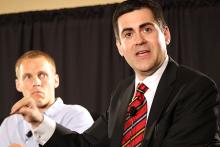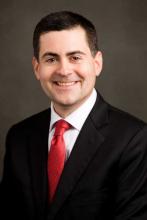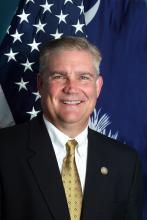Russell Moore

When Southern Baptists convened a national conference in Nashville, Tenn., this week to discuss issues of human sexuality, bringing conservative evangelicals and LGBT Christian activists into the same ballroom was a recipe ripe for potential fireworks.
Perhaps the most shocking thing was how few fireworks there were.
The Southern Baptist Convention’s Ethics and Religious Liberty Commission was clear: Sex is reserved between a man and a woman within the bonds in marriage. And openly gay evangelicals in attendance were equally clear: Homosexuality is not incompatible with Christianity.
No concessions were made, but leaders on both sides expressed surprise at how the two agreed to coexist. Put another way: The old emphasis on “Love the sinner, hate the sin” has become more a version of simply “Love all sinners. Ask questions later.”
“I do want to apologize to the gay and lesbian community on behalf of my community and me for not standing up against abuse and discrimination directed towards you. That was wrong and we need your forgiveness,” said North Carolina megachurch pastor J.D. Greear, drawing applause.
“We have to love our gay neighbor more than our position on sexual morality.”

Southern Baptist leader Russell Moore has denounced reparative therapy, the controversial idea that people who are gay or have same-sex attraction could become straight.
Joining a chorus of other religious leaders who have departed from a once-popular therapy, some evangelical attempts at reparative therapy have been “severely counterproductive,” Moore told a group of journalists during a press conference at the Ethics and Religious Liberty Commission’s national conference in Nashville on Oct. 28. He also gave similar remarks to the conference of about 1,300 people.
“The utopian idea if you come to Christ and if you go through our program, you’re going to immediately set free from attraction or anything you’re struggling with, I don’t think that’s a Christian idea,” Moore told journalists. “Faithfulness to Christ means obedience to Christ. It does not necessarily mean that someone’s attractions are going to change.”
Moore said evangelicals had an “inadequate view” of what same-sex attraction looks like.
![Houston Mayor Annise Parker. Photo courtesy of Zblume (Own work) [Public domain], via Wikimedia Commons/RNS.](https://sojo.net/files/styles/medium/public/blog/Annise_Parker-336x369.jpg)
Houston Mayor Annise Parker, who drew headlines for becoming the first openly lesbian mayor of a major American city, led support for the ordinance. The measure bans anti-gay discrimination among businesses that serve the public, private employers, in housing and in city employment and city contracting.
Under one of the hotly contested parts of the ordinance, transgender people barred access to a restroom would be able to file a discrimination complaint.
The ordinance, which exempted religious institutions, was passed in June, though its implementation has been delayed due to legal complaints.

Prominent conservative voices are criticizing the decision to bring two medical missionaries who contracted Ebola back to the United States for treatment.
Real estate mogul Donald Trump and retired neurosurgeon Dr. Ben Carson were both critical of bringing the infected missionaries back to the U.S. Columnist Ann Coulter went further, questioning why the missionaries were working in the “disease-ridden cesspools” of Africa.
Dr. Kent Brantly, with Samaritan’s Purse, and Nancy Writebol, with Service in Mission, are medical missionaries who were infected with Ebola while working with patients in Liberia. They are being treated at Emory University Hospital in Atlanta.
“If Dr. Brantly had practiced at Cedars-Sinai hospital in Los Angeles and turned one single Hollywood power-broker to Christ, he would have done more good for the entire world than anything he could accomplish in a century spent in Liberia,” Coulter wrote in a column.
But the professional provocateur is facing a backlash from the mainstream Christian establishment, especially evangelicals, for whom overseas missionary work is an article of faith.

The issues sound like they belong on the therapist’s couch:
The couple that hasn’t had sex eight months into their marriage.
The parents who can’t deal with their son’s homosexuality.
The male teen who wants to be called by a girl’s name.
But they’re also the kinds of topics that frequently crowd the inbox of Russell Moore, who recently marked his first anniversary as the Southern Baptist Convention’s top public policy expert.
Though he often grapples with contentious political issues — the Hobby Lobby case, religious persecution, and, most recently, the immigrant border crisis — Moore has spent much of his first year at the Ethics & Religious Liberty Commission writing blog posts on Christian sexual ethics.
“Probably day to day I’m dealing with more church issues of how do we deal with these tough ethical issues,” he said recently.

Southern Baptists prayed Wednesday that the Supreme Court would rule in favor of the Green family, the evangelical owners of the Hobby Lobby craft chain that challenged the contraception mandate in the Affordable Care Act.
Historians said the prayer from the podium during the SBC’s annual meeting about a pending court decision was noteworthy, though Southern Baptists have preached and issued statements for years on current events.
“I think it’s unusual for it to happen at a convention event,” said Bill Sumners, director of the Southern Baptist Historical Library and Archives.

Christian relief organization World Vision has reversed its decision after announcing this week that it will no longer define marriage as between a man and a woman in its employee conduct manual.
The earlier decision was a groundbreaking change for the Christian institution that came with heavy criticism from evangelicals. After its initial announcement, the Assemblies of God had urged its members to consider dropping support.
Ryan Reed tweeted on Wednesday (March 26), “My wife works for WV. In today’s staff meeting Stearns announced that so far 2000 kids dropped.”
World Vision’s child sponsorships are $35 a month, which means the organization could have lost at least $840,000 in revenue over the longterm.
About $567 million of World Vision’s $1 billion budget comes from private contributions, according to the 2012 annual report, according to Christianity Today.
“We’ve listened,” World Vision president Stearns told reporter, to supporters who were concerned about the conduct change in policy. “We believe we made a mistake. We’re asking them to forgive and understand our poor judgement in the original decision.”

It is easy to see that over the coming weeks thousands of evangelicals will withdraw their support from World Vision. And Dr. Moore is absolutely right. As this begins to take place, thousands of children will suffer because of the lack of funding from their former sponsors who decided that this theological and political issue was more important than their life. It is a sad day when followers of Jesus Christ will chose to make a theological/political point by withholding funds from children in life-and-death situations.
It is indeed a sad day for evangelicalism. It is sad because we have willingly put on blinders to hide our eyes from the truth of the words of our Lord Jesus Christ. We have chosen to ignore the entire example of his life and the bulk of his teachings and instead pick up our weapons and engage in culture wars instead of working to love God and love our neighbors as ourselves, which, by the way, sums up all of the biblical laws. We have chosen to ignore Jesus’ harsh words to the Pharisees who valued doctrinal rightness over the sacrifice of justice that God has always called us to.

American evangelicals are denouncing a new Uganda law that criminalizes homosexuality, reiterating a position that many have held for years but which has nonetheless drawn scrutiny and skepticism from critics.
Since 2009, several American pastors and leaders have condemned legislation in Uganda that in its initial version imposed the death penalty for some offenders. Under the revised law signed recently by President Yoweri Museveni, the death penalty was removed and replaced with life in prison in some cases.
Now, American evangelicals who insist they never supported either version of the law nonetheless find themselves playing defense, saying their statements against homosexuality at home are being twisted as an endorsement of harsh penalties against gays and lesbians abroad.
One of the most meaningful things I get to do in my work as a Ph.D. student in political science is assist Jim Wallis with a course he teaches at Georgetown every fall titled "Faith, Social Justice, and Public Life." Jim is well known as the founder and leader of Sojourners and as a lifelong advocate for social justice. Through lectures, discussions, and guest speakers, our students learn about how and why clergy and lay people of various religious backgrounds advocate for public policies as expressions of their faith commitments. This fall, the push for comprehensive immigration reform was one of the case studies we examined with our students.
I'm no expert in immigration policy. But, as a political scientist, I can offer an informed assessment about when, why, and how the House of Representatives will pass the reform in 2014. This will be the subject of a future post. For now, though, I want to highlight some distinctive features of the debate that I have noticed as an observer of religion in American politics. I do have a layman's interest in the theological justifications being offered in support of (and, perhaps surprisingly, against) comprehensive immigration reform. But for now, I will focus mostly on the politics.

Can you be scared into salvation?
For the past 41 years, Liberty University’s “Scaremare” has attracted thousands to its haunted attraction, where students in costumes deliver thrills and screams throughout a guided tour.
The university’s Center for Youth Ministries sponsors the annual October event, boasting to be one of the largest of its kind in the Southeast.

When a head of state is responsible for the deaths of 100,000 of his people and has used chemical weapons against innocent civilians — the world needs to respond. In one massive attack, the evidence appears to show that 1,429 people, including 400 children, suffered horrible deaths from chemical weapons banned by the international community. That is a profound moral crisis that requires an equivalent moral response. Doing nothing is not an option. But how should we respond, and what are moral principles for that response?
For Christians, I would suggest there are two principles that should guide our thinking. Other people of faith and moral sensibility might agree with this two-fold moral compass.

Russell Moore, the new chief ethicist for the Southern Baptist Convention, has Jesus in his heart, Wendell Berry on his bookshelf, and Merle Haggard on his iPod.
His first few weeks in office have been a kind of baptism by fire.
The 41-year-old Moore took over as president of the Nashville, Tenn.-based Ethics and Religious Liberty Commission on June 1, just as prominent Southern Baptists were calling for a boycott of the Boy Scouts. Then came the Supreme Court’s recent decision to strike down the Defense of Marriage Act, which landed Moore in the spotlight as an opponent of same-sex marriage.

WASHINGTON — Just days after the Obama administration issued final rules to religious groups for its contraception mandate, a broad coalition spearheaded by Catholic and Southern Baptist leaders is pushing back, saying the rules threaten religious liberty for people of all faiths.
In an open letter titled “Standing Together for Religious Freedom,” the group says the final rules from the U.S. Department of Health and Human Services violate their freedom of conscience.
“We simply ask the government not to set itself up as lord of our consciences,’’ said Russell Moore, president of the Southern Baptist Convention’s Ethics & Religious Liberty Commission. He was joined by Archbishop William E. Lori of Baltimore at a news conference at the National Press Club.
“HHS is forcing Citizen A, against his or her moral convictions, to purchase a product for Citizen B,” reads the open letter signed by dozens of leaders from evangelical, Orthodox, Mormon and Hare Krishna groups. “The HHS policy is coercive and puts the administration in the position of defining — or casting aside — religious doctrine. This should trouble every American.”
The twin Supreme Court rulings on Wednesday that further opened the door for gay marriage in the U.S. were not entirely unexpected, and the condemnations from religious conservatives angry at the verdicts were certainly no surprise either.
So the real question is what gay marriage opponents will do now.
Here are four possible scenarios that took shape in the wake of Wednesday’s developments:
“DOMA is dead.”
Such were the chants heard outside the United States Supreme Court yesterday when it was announced that the highest judicial body in the nation voted 5-4 to strike down the Defense of Marriage Act (DOMA). That’s right. As of yesterday, there is no longer a federal law defining marriage as a union between a man and woman.
Of course, not every American is roundly rejoicing. Responses from the Christian community, which has become more divided over the issue in recent years, are mixed. Conservative Christians seem mostly despondent while the progressives among them are mostly celebrating. I spoke with several prominent Christians from across the political spectrum today to get their reactions to the Court’s decision:

The vast majority of evangelicals have voted with the GOP in recent elections. In fact, despite some qualms about his Mormon faith, 79 percent of evangelicals voted for Republican nominee Mitt Romney in 2012, the same percentage that voted for President George W. Bush in 2004.
So why would the party hire its former South Carolina chairman to lead engagement to a group that for a generation or more has been the reliable anchor of the party faithful? Here are four reasons.